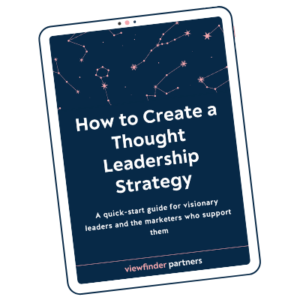Two little words are keeping a lot of people up at night.
Thought. Leader.
What does it mean to be a thought leader? Who gets to call themselves an expert? And do we need a shared definition we can all agree on? Recently, I’ve been talking to a lot of people about that.
One conversation really blew my mind. I was talking to Andy Crestodina, co-founder of the Chicago web agency Orbit Media. He’s someone I’d put on my personal top 10 list of marketing experts. He’s a prolific blogger, an excellent speaker, and one of the most well-connected people I know in the industry. He has been in the web design and interactive marketing space since 2000. He wrote a book, “Content Chemistry,” that Jay Baer called “the most practical book ever written about modern digital marketing.”
But Andy told me he doesn’t consider himself a thought leader.
I was really confused. If Andy isn’t a thought leader, who is? And do we need to rethink the idea of being a “thought leader” so that people like Andy proudly wear the badge?
Here’s what happened. Andy is developing a talk for next year about how thought leadership affects SEO. He hasn’t historically talked much about “thought leadership” — his sweet spot is SEO and content marketing.
As we talked about what makes someone a thought leader, we ended up … kind of arguing about the term for the better part of an hour.
Why? Because Andy thinks about thought leaders as people who have strong opinions — people who are willing to take a stand and be controversial.
He pointed to leaders at Nike who made the decision to feature Colin Kaepernick in their ads. Or Jason Fried, a co-founder of Basecamp, who often takes controversial stands, like his recent rallying cry against Google’s ad practices.
That’s not Andy. He says he’s not a thought leader because his writing is technical. It’s how-to stuff. He uses his content to teach. He’s not offering hot takes or emotion-inducing stances.
And this is where we disagreed. Because I don’t think thought leadership is just about having radical Opinions (capital O). Instead, I think thought leadership is about having perspective. It’s about looking back on years of experience and built-up expertise and offering a helpful view on an industry, or a thoughtful recommendation for a client.
Thought leadership is about making space to reflect on your experiences, clarifying your perspective, and telling people about it in a helpful way — packaging your ideas so that other people can digest and use them.
Let’s think about that. What sets people apart as “thought leaders” isn’t just their big ideas. It’s the fact that they put in the time to create that perspective. To reflect. Clarifying your ideas is really hard work.
Just this week, I have spent hours on the phone with people I’d definitely classify as “thought leaders,” who are doing the work to clarify their perspective. They have put up with me asking question after question about their careers, what they’ve learned, what others should think about, and why it all matters. Even when the ideas are there, accessing them is often really difficult.
And that’s why marketers are so important. A lot of potential thought leaders are busy doing the work and serving their customers. It’s our job as marketers to help them look up from the day-to-day grind, reflect, and develop their perspective — and then package it into a message and a story for a wider audience.
Thought leaders aren’t the loudest voices in the room. They aren’t the people with the most controversial opinions. Thought leaders are people who have ideas and perspective, and who take the time to reflect and share that perspective.
By that definition, Andy definitely fits the bill. He shared a time-lapse video (inspired by Bob Ross) that shows the HOURS he spends crafting every super-informative blog post he writes. Andy puts in the time. He creates perspective, and shares it generously.
I’m curious what you think. What makes someone a thought leader? Are you a thought leader? Could you be? Who in your organization is a thought leader who needs help polishing their well-earned perspective? And is it time we take back the term “thought leader” as someone we’d actually like to be? Can we make it a badge of honor instead of a cheesy LinkedIn headline?
Tell me! I’d love to hear how you’re thinking about this.

![what is a thought leader [paint palette image]](https://viewfinderpartners.com/wp-content/uploads/2019/11/im-not-a-thought-leader-1.jpg)





